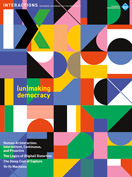Authors:
Mon Mohapatra, Rachel Kuo
Data-driven technology usage abounds in policing and incarceration: biometric surveillance, facial recognition software, ShotSpotter, license plate readers, cell tower simulators ("Stingrays"), drones, metadatabases, and myriad predictive technologies. Ongoing protests against police violence and mass incarceration have created an urgent push to challenge and dismantle policing, including the carceral tools and surveillance technologies utilized by law enforcement, and also increased widespread public interest in defunding the police. Large amounts of funding and investment nonetheless continue to be driven toward research on policing and technology, including emerging new partnerships between law enforcement, academic institutions, and large technology corporations.
In his fiery castigation of relationships between Silicon Valley and academic institutions, Rodrigo Ochigame writes, "No defensible claim to 'ethics' can sidestep the urgency of legally enforceable restrictions to the deployment of technologies of mass surveillance and systemic violence" (see sidebar). Indeed, Ochigame points to an insidious pattern of collaborations between corporations, academia, and government, which perpetuate carceral violence by prolonging the possibility of "better," "improved," and "less biased" technology.
Despite claiming to meet the anti-carceral demands of the moment, these research ventures legitimize law enforcement bureaucracy as capable of solving police violence, while facilitating police presence within radical milieus of abolitionist dissent. Through these partnerships, a body of scholarship has emerged on the new machinery of policing, such as predictive analytics [1], data surveillance [2], and body cameras [3]. This research uses methodologies drawing on police data, sources, and perspectives as primary source material. These methods do not sufficiently reject the role of policing, instead assimilating the source of violence by configuring police as the solution for police brutality [4].
Between June 2020 and June 2021, a small group of organizers from different local abolitionist campaigns collectively read several of these texts. We learned the conclusions often drawn in this genre of writing are that the technologies used in policing must be improved or regulated, rather than the institution itself abolished. Without an explicit politics that seeks the end of policing, this body of scholarship continues to extend the genre of "police science," a mode of extractive innovation and inquiry that colludes with academia, private enterprises, and public interests to capitalize on the violent relationship that police have with vulnerable communities. We argue that forms of knowledge production not antagonistic to police will be easily incorporated back into systems that sustain violence and further reinforce the role of policing in society.
Abolitionist movements posit that policing is a category of violence and cannot be technologically or democratically managed.
Intellectual and political frameworks that take law enforcement as the site of change through "reimagining police" or discussing "futures of policing" facilitate the institutional capture of abolitionist dissent, entrenching impermissible reforms as "abolitionist" without actually providing strategies to end police violence and that of the prison industrial complex. These forms of research often are enthusiastically adopted into contemporary political discourse seeking the development and improvement of policing.
Abolitionist movements posit that policing is a category of violence and cannot be technologically or democratically managed. The abolitionist approach to technologically enabled policing begins with a simple insight: The problems associated with policing and prisons are not ones that can be solved with better technology, nor with better governance.
We assert the need to move past genres of criminal justice and police science on how to "improve" law enforcement and the technologies that enable it. We cannot criticize police surveillance and technology use without criticizing the larger capitalist, racial, and colonial contexts of carceral technologies. Rather than demanding police surveil less or employ data better, we push for an end to the production of violent technologies and systems. We need subversive analyses that challenge policing as a system of violence.
With gratitude to Sarah T. Hamid and Micah Herskind for the ongoing study and conversations.
1. Brayne, S. Predict and Surveil. Oxford Univ. Press, 2020; https://global.oup.com/academic/product/predict-and-surveil-9780190684099?cc=us&lang=en&
2. Ferguson, A.G. The Rise of Big Data Policing: Surveillance, Race, and the Future of Law Enforcement. New York Univ. Press, 2017; https://www.kirkusreviews.com/book-reviews/andrew-guthrie-ferguson/the-rise-of-big-data-policing/
3. Newell, B.C. Police Visibility Privacy, Surveillance, and the False Promise of Body-Worn Cameras. Univ. of California Press, 2021; https://www.ucpress.edu/book/9780520382909/police-visibility
4. Stanford Criminal Justice Center. Emerging Police Technology: A Policy Toolkit. 2020. https://law.stanford.edu/publications/emerging-police-technology-a-policy-toolkit/
Mon Mohapatra is an Indian abolitionist, feminist propagandist, and organizer based in New York City working on issues of decarceration, surveillance, and dismantling the police-industrial complex bit by bit. [email protected]
Rachel Kuo writes, teaches, and researches race, social movements, and digital technology. She is currently a postdoctoral researcher at the Center for Information, Technology, and Public Life at the University of North Carolina at Chapel Hill and a visiting scholar at Duke University's Asian American and Diaspora Studies program. [email protected]
 Sidebar: Reading Recommendations for the End of Policing
Sidebar: Reading Recommendations for the End of Policing
- Ochigame, R. The invention of 'ethical AI:' How big tech manipulates academia to avoid regulation. The Intercept. Dec. 20, 2019; https://theintercept.com/2019/12/20/mit-ethical-ai-artificial-intelligence/
- Carceral Tech Resistance Network: http://www.carceral.tech/
- Wang, J. Carceral Capitalism. MIT Press, 2018.
- Browne, S. Dark Matters: On the Surveillance of Blackness. Duke Univ. Press, 2015.
- Critical Resistance. Reformist reforms vs. abolitionist steps in policing. 2020; https://static1.squarespace.com/static/59ead8f9692ebee25b72f17f/t/5b65cd58758d46d34254f22c/1533398363539/CR_NoCops_reform_vs_abolition_CRside.pdf
- Benjamin, R. Race After Technology: Abolitionist Tools for the New Jim Code. Polity Press, 2019.
- Purnell, D. Becoming Abolitionist: Police, Protests, and the Pursuit of Freedom. Astra Publishing, 2021
- Whitlock, K. and Heitzeg, N. Carceral Con: The Deceptive Terrain of Criminal Justice Reform. Univ. of California Press, 2021.
Copyright held by authors
The Digital Library is published by the Association for Computing Machinery. Copyright © 2021 ACM, Inc.








Post Comment
No Comments Found